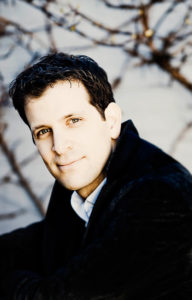Warm Up: Luca Pisaroni Trades Cadenzas for Canines
By Olivia Giovetti | There’s a whole lotta Luca in New York this season: The Italian bass-baritone, who grew up in Verdi’s hometown of Busseto, walked away with the show as Leporello in the Met’s new Don Giovanni this past fall. He returns to the opera house this week in the company’s New Year’s Eve Baroque pastiche The Enchanted Island singing Caliban, a role he jokes is “Leporello flying to New York, getting in a crash, landing on an island and getting rescued six months later.”
With a tradition of operatic performance as his birthright and now a part of his extended family (his father-in-law is Thomas Hampson) there’s a lot of love for opera in Pisaroni. But what he’s not terribly keen on is overthinking it. He gets his game face on with normal walks and unconventional runs.
- Photo: Marco Borggreve
Forget ‘Nessun Dorma’
If I have a show at 7:00, for example, I try to sleep as long as I can and then I go out for a walk with my dogs and then I eat and then I go back to bed. I know it sounds like an old man, but I always sleep. In the afternoon? Always. Before a show? Always. Because I want to be sure that I’m full of energy around 7:30 pm; around the time of the performance. And I know if I get up too early, if I don’t take a nap, 7:30’s a critical moment where actually your energy level goes a bit down. So I always sleep.
Finding Your Own Voice
There are colleagues that go in an hour before a show and sing for an hour. If I do that, then I have no voice for the show. Normally I do fast vocalizing. I don’t remember who told me, but it was a famous singer who always told me, “You don’t develop high notes with sustained vocalizations, but with fast vocalizations.” And so this is how I do it before a show: I do scales, arpeggios and then I know—you feel—when I am ready. As my father-in-law says, “The audience doesn’t want to hear you warming up.” So you should do the warm-up before and so I warm up until I know that my voice is ready.
That Magic Moment
For me, if my passaggio is easy, I know that I’m okay. So I’m working until my passaggio comes without effort. Then I know I’m gonna have high notes and I’m gonna have low notes. And this is something that I learned. You need to warm up the center: If the center of your voice is okay, then the rest will come.
Never Serve Overdone
I believe in singing, in warming up slowly, which is to say I don’t sing for half an hour in a row. I just sing for five minutes, then I do nothing for half an hour, then I sing another five minutes, then do nothing for half an hour. I never sing arias from the piece I’m doing. Maybe I might sing a phrase, but I never sing the whole thing because I don’t want to spoil it. In the beginning of my career I’d sing the whole thing and in the dressing room it would sound great and then I’d get onstage and it’d sound worse. I believe in the fact that I think about something else and then I know five minutes before it starts, everything’s going to be focused on the performance.
Tune Out
I don’t think about the performance at all, to be honest. I let my subconscious do the work for me, but you’re never gonna find me in a dressing room thinking deeply about what I’m going to do—never. [In rehearsals,] I need to write down the musical notes, but the stage notes I never write down. And I tell you I could jump in a certain production from five years ago and remember exactly what I have to do. But if somebody says, “I want a crescendo there,” I write it.
And His Little Dogs, Too
Having two dogs helps me to be normal, meaning you cannot spend your life worrying just about singing. The walks with the dogs for me are the best thing. It clears my mind, and I think about something else. Otherwise if I get up at 9:00 and the performance is at 7:00, that’s ten hours of pain. I’d just be thinking, “Tonight I have to perform.” Instead you do something completely different. I don’t believe in thinking too much, because you should have done your work before you get to [the day of the show].
Last-Minute Laps
One peculiar thing that I do is I run around onstage. Everybody laughs at me because everybody’s just getting ready and you’re going to see me in costume doing two laps around the stage at the Met. The stage managers said to me [during Don Giovanni], “Normally I should call you three minutes before, but I call you at five because I know you want to do two laps.” And I was like, “Yes! Brava!” For that production, I dropped my hat, then I ran twice around and then I sit down about two minutes before “Notte e giorno” and then I’d start.
